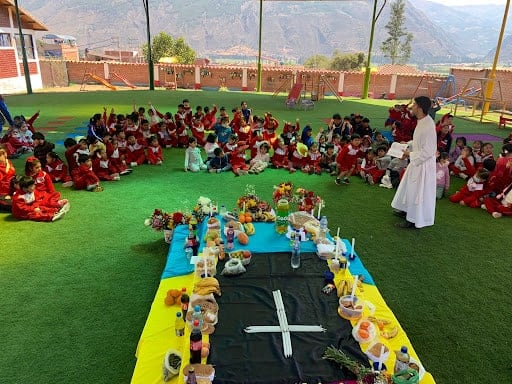Remember me
Though I have to say goodbye
Remember me
Don’t let it make you cry
For even if I’m far away I hold you in my heart
I sing a secret song to you each night we are apart
Remember me
Though I have to travel far
Remember me
Each time you hear a sad guitar
Know that I’m with you the only way that I can be
Until you’re in my arms again
Remember me 1
We are forgetful people. I say that not only because I have forgotten my cell phone in a colectivo (public taxi) one too many times, but because here in the small Andean town of Urcos, Perú, at over 10,000 feet, 10,000 people and two stop lights, it is hard not to see people remembering: remembering their loved ones, especially on All Souls Day (November 2nd), which along with All Saints on November 1st, are holidays here. It was a few days before All Souls Days, and the college-age catechists (who help lead the first communion and confirmation classes) and I watched the movie Coco. Its memorable song “Remember Me” captures a core part of the Christianity, namely, we are to remember.
But what are we to remember?
“Though I have to say goodbye
Remember me
Don’t let it make you cry [forever]”
I am about to walk into the high school and my phone rings. The sacristan of the church is calling me to see if I am available to say a funeral prayer service since the Jesuit pastor is not available. It is not the first time. Even though I have yet to celebrate a funeral service in English as a Jesuit, I have said at least twenty since arriving last year. Funerals for people younger than me, the same age as my brother, and people who were young parents or grandparents. How can we make sense of death amid heartache? The sorrow, grief, and tears I see and hear while at the cemetery remind me of the pain of losing a loved one. I am at a loss of words, especially in Spanish, in trying to offer my condolences to those gathered for someone I never knew. I think to myself, “Jesus, how did you deal with sorrow?”
When Jesus saw and heard the sobbing of Mary, Martha, and the other mourners over the death of Lazarus, the Gospel of John succinctly states, “And Jesus wept.” 2His tears show a God who is fully human, who is not removed from our sadness and grief when a loved one dies. Attending a funeral of a beloved can be one of the lowest moments in our lives since we have lost someone we loved profoundly. Mourning, as well as denial, anger, and depression among others, are essential and natural parts of our healing process.
At the same time, it is precisely at that moment we as Christians are asked to remember. Remember what? For one, we remember Jesus Christ’s victory over death, his resurrection. Mourning does not deny our hope in the resurrection, but acknowledges that in this world there is still death. When we hold our sorrow in tension with Christ’s victory over death, we can, like St. Paul, say,“Where, O death, is your victory? Where, O death, is your sting?” 3 Death is the ultimate effect of sin in the world, yet with his resurrection Christ defeated sin. Yes, we can and should cry for our beloved dead and for those who mourn the death of their loved ones – but not forever. Death has been conquered. This belief should not be something foreign to us even though during our grief it is easy to forget – each Sunday at Mass we say the Apostles’ Creed professing, “I believe in…the resurrection of the body and life everlasting.” We remember that it is okay to weep as we hold fast to Christ’s victory over death.
“For even if [you’re] far away I hold you in my heart”
Once classes finish at school, I hop in a colectivo to the church to celebrate the funeral I was told about that morning. I accompany those gathered to the cemetery and stay to listen to various people offer eulogies. Before concluding, she says the name of their deceased beloved three times. After each time, we respond in unison: “Presente.” The first time I responded with those gathered, it made me tear up. What a heavenly paradox, for even though the deceased is no longer physically alive, they are still present to the living who remember them. Even though I never met the deceased, after hearing the testimonies, I felt like I have. There is a measure of silence. Then suddenly the band is cued to start playing their customary song. But remembrance not only occurs at funerals – it is central to Christianity.
Remembrance (referred to as anamnesis in the Church) is one of the two elements “at the heart of each sacramental celebration, most especially of the Eucharist.” In short, anamnesis means to make a past event become present now. For example, during Mass the congregation asserts or sings one of the versions of the memorial acclamation (which is said directly after the consecration of the bread and wine): “We proclaim your Death, O Lord, and profess your Resurrection until you come again” or “When we eat this Bread and drink this Cup, we proclaim your Death, O Lord, until you come again.” Perhaps that phase – “We proclaim your Death, O Lord, and profess your Resurrection until you come again” – is the secret song we sing to God. Singing that memorial acclamation reminds us that although Jesus is no longer physically with us, each time we gather to celebrate the Mass, we remember what Christ has done for us, namely, his Paschal Mystery (i.e., his life, death, and resurrection). However, those historical events of his life are not a moment frozen in the past, but become in a certain way present and real to us 2,000 years later. Anamnesis is why the Church teaches that Christ is not re-sacrificed at each Mass, but that we enter into that one moment in history when he was nailed to a cross for our sin. In the context of funerals, perhaps that customary song the band always plays is their version of that secret song, in that we remember that deceased person’s life, acknowledge their sad death, and have faith in their resurrection with Christ.
“Though I have to travel far”
My phone rings at night. It is a good college friend calling me out of the blue. When I moved here to Urcos last year, there were so many unknowns. One of them was how I would keep in touch with family and friends. However, I realize I have kept more in touch with some people now that I am over 3,500 miles away from people in the States. In other words, it was really just in my head that I was physically far away. Although those who call me are still living, I think there is a slight parallel between them and those who have died. Richard Rohr, a Franciscan priest and founder of Center for Action and Contemplation (CAC), states how the dead are at one with the living by stating, “I think the collective notion of oneness is what Christians were trying to verbalize when they made a late addition to the ancient Apostles’ Creed: ‘I believe in the communion of saints.’ They were offering us the idea that the dead are at one with the living, whether they’re our direct ancestors, the saints in glory, or even the so-called souls in purgatory.” What are we to remember? That in a certain sense, the distance between our loved ones, whether 3,500 miles away or deceased, is only in our heads, for “the dead are at one with the living.”
“Know that I’m with you the only way that I can be
Until you’re in my arms again
Remember me”
I am attending Mass in the Jesuit parish in Urcos, and I notice a family member in a pew holding a picture of their deceased beloved in their arms. How touching it is that we, the living, are able to do something concrete for the deceased. One reason we have Catholic funerals is to offer up the holy sacrifice of the Mass to intercede on behalf of the person who has died. During the Eucharist prayer, the priest asks God “to remember your servant N.” so that “s/he who was united with your Son in a death like his, may also be one with him in his Resurrection. One way in which we, the living, are able to “be with” the deceased is by having the Mass offered for them. In that way, we remember that our deceased beloved are in our arms again.
Who and what do you want to remember and hold in your arms again? Perhaps we all are like Dory (the blue tang fish from Finding Nemo), for given that we are forgetful people, we do and say things to help us remember our deceased loved ones. We weep, shout out presente, say eulogies, sing secret songs, and hold others in our arms. The same is true to remember Christ. We weep, sing secret songs, and celebrate Mass to remember Christ’s life, death, and resurrection. Like Christ who said farewell to his disciples before his Ascension, we all have to say goodbye, yet we always remember.


